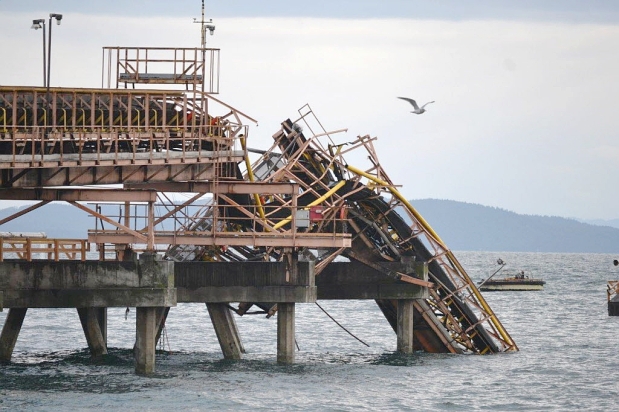The following is the text of a news release from the Transportation Safety Board of Canada:
(RICHMOND, British Columbia) (March 4) — The Transportation Safety Board of Canada (TSB) today released its investigation report (M12W0207) into a terminal striking by bulk carrier Cape Apricot in Roberts Bank, British Columbia (BC).
At 0045 Pacific Standard Time on 7 December 2012, the bulk carrier Cape Apricot, while under the conduct of a pilot and assisted by two tugs, struck the causeway and conveyor system at the Roberts Bank terminal. As a result of the impact, the causeway and conveyor collapsed into the water, and the vessel's bow sustained damage. There was minor pollution and no injuries.
In this occurrence, the pilot and master discussed the vessel's passage and completed the necessary documentation for the pilot-master exchange. However, the investigation found that the Cape Apricot's course to Roberts Bank placed the vessel in a direct line of approach to the trestle. This path required a tight alteration of course to starboard, but given the vessel's speed and direct approach, the Cape Apricot's turn to starboard was neither timely nor sufficient, and the vessel struck the trestle.
As the vessel approached the basin, the master did not seek clarification or question the pilot. Nor had the pilot established or communicated any abort points. Without effective communication regarding their shared mental model during the approach, the master and the pilot did not identify the developing risk as the manoeuvre progressed, and did not take timely corrective action.
On the west coast of Canada, responsibility for the operation, maintenance and administration of pilot services for compulsory pilotage areas lies with the Pacific Pilotage Authority (PPA). However, the PPA does not directly employ pilots, other than those operating in the Fraser River. Rather, the PPA contracts the British Columbia Coast Pilots, Ltd. (BCCP) to provide pilotage services for vessels along the BC coast.
A safety management system (SMS) enables risks to be identified, analyzed and mitigated. Neither the PPA nor the BCCP has a comprehensive SMS. The investigation determined that neither the PPA nor the BCCP has:
- a formal risk assessment process;
- an accident/incident review process;
- for pilots to ensure bridge resource management best practices are in place throughout a voyage.
Without an SMS in place, pilotage organizations may not properly identify hazards and mitigate them, thereby placing vessels at risk. Many TSB reports have emphasized the advantages of SMS in the marine industry.
Click here to view the complete investigation report.

